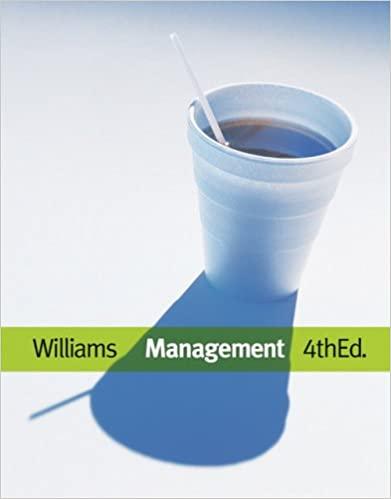Question
1. Which of the following is not true of beliefs?Select one: a.They result in an emotional reaction to an object. b.They are assumptions about the
1. Which of the following is not true of beliefs?Select one: a.They result in an emotional reaction to an object. b.They are assumptions about the probability that an object exists. c.They are non-evaluative. d.All of the above are untrue.
2. Which of the following is true of values?Select one: a.They have no effect on behaviour. b.They always have a behavioural impact. c.They do not involve judgements about objects. d.All of the above.
3. Which of the following is not true about attitudes?Select one: a.They are held towards something specific. b.They are constantly subject to rapid change. c.They cannot be observed directly. d.They have strong behavioural implications.
4. he attitude component which results in a degree of liking or dislike of an attitude object is ________.Select one: a.cognitive b.affective c.behavioural d.consistency
5. The functional approach to attitudes assumes that:Select one: a.people are born with their attitudes. b.people always keep their attitudes secret. c.people would rather not have attitudes. d.attitudes are held because they serve a useful purpose for people.
6. Attitudes are formed by:Select one: a.direct experience. b.exposure to objects. c.socialisation and social learning. d.all of the above.
7. The relationship between job satisfaction and employee productivity is best expressed by:Select one: a.a satisfied worker is a productive worker b.job satisfaction leads to high productivity. c.high productivity leads to job satisfaction. d.a very weak association between satisfaction and productivity.
8. The most important processing functions that influence perceptions are carried out:Select one: a.in sensory receptors. b.along the nervous pathways between sensory receptors and the brain. c.in the appropriate cortex of the brain. d.all of the above.
9. Which of the following is true about our perceptions of an object?Select one: a.Objects are usually considered in isolation. b.As someone walks towards us, we tend to think that they are growing in size. c.The context in which an object appears has little or no influence on its identification. d.Objects are always seen against a background.
10. Cognitive complexity refers to:Select one: a.rapid mental processes. b.the number of independent dimensions used by a person to evaluate objects and people. c.having complicated mental processes. d.having a good memory.
11. Which of the following is not true of stereotypes?Select one: a.They help reduce the amount of information processing necessary to reach a perceptual judgement. b.They can result in wildly inaccurate generalisations. c.They are always negative. d.They are based on the assumption that some attributes go hand-in-hand.
12. A self-fulfilling prophecy is:Select one: a.a special type of halo effect. b.a prophecy that comes true solely because it has been made. c.an extreme form of stereotyping. d.a form of prejudice.
13. he tendency, when observing someone's behaviour, to impute that it is automatically the result of a person's mental processes is an example of:Select one: a.selective perception. b.the fundamental attribution error. c.the actor-observer effect. d.the halo effect.
14. Research evidence suggests that in the disciplinary situation, a manager is more likely to make an internal attribution about an employee if:Select one: a.the subordinate's behaviour is similar to that of other employees. b.the employee is female. c.the manager has personal experience of the employee's job. d.the employee is male.
Step by Step Solution
There are 3 Steps involved in it
Step: 1

Get Instant Access to Expert-Tailored Solutions
See step-by-step solutions with expert insights and AI powered tools for academic success
Step: 2

Step: 3

Ace Your Homework with AI
Get the answers you need in no time with our AI-driven, step-by-step assistance
Get Started


